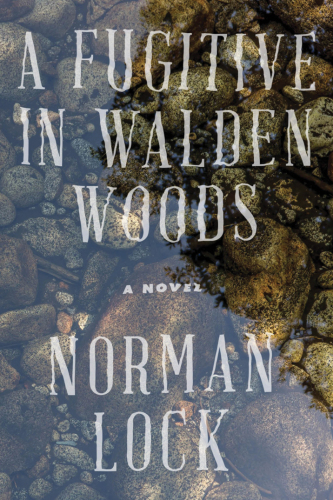
A Fugitive in Walden Woods
The American Novels
کتاب های مرتبط
- اطلاعات
- نقد و بررسی
- دیدگاه کاربران
نقد و بررسی

Starred review from April 17, 2017
The fourth installment of Lock’s the American Novels series (American Meteor) is the unflinching, penetrative, and bravely earnest account of fictional escaped slave Samuel Long’s (the fugitive of the title) time living in Walden Woods as Henry David Thoreau’s neighbor. After Thoreau’s death, Long reflects on his time with the American transcendentalists in his youth, when his freedom was tenuous and his sense of identity fluid. After Long makes his escape from slavery, Ralph Waldo Emerson gives him protection and asks that he stay in the woods with Thoreau and report on his progress. Along the way, Long becomes a part of Thoreau’s circle of luminaries, including Nathaniel Hawthorne and William Lloyd Garrison. As Long comes into his own, his famous compatriots are pushed to face the implications of the role they would have him play in their own narrative. Long’s remembrance of his friend is reverential while exploring the wider social context; he contemplates the intersection of his experience as a runaway slave—forced to put his life in the hands of white abolitionists like Emerson, while Thoreau’s experiment is paid for with privilege—and transcendentalist beliefs in man’s inherent goodness and individualism. With melodic prose that marvelously captures Long’s searing insights and rich observations, Lock’s imaginative novel is a stunning meditation on idealism and the cost of humanity.

The protagonist of Lock's latest novel escapes from slavery and falls in with a group of transcendentalist thinkers in New England.Lock's fiction frequently takes as its starting point a pre-existing idea or creative work ranging from colonialist delusions to Antarctic exploration and then pushes it in strange and unexpected directions. Each installment of his American Novels series riffs on an existing work or creator of 19th-century art: The Boy in His Winter (2014) sent Huckleberry Finn adrift in time, while The Port-Wine Stain (2016) channeled Edgar Allan Poe's tales of mystery and dread. His latest novel is among his most restrained works and one of his most powerful. It is presented as the narrative of Samuel Long, a man who flees the horrors of slavery in the 1840s and makes his way north, where he links up with a group of the pre-eminent American thinkers of the time-Henry David Thoreau among them. Lock neatly captures the intellectual collegiality and sharp conversations among his characters. But the novel doesn't lose sight of the gulf between Samuel and his friends--as someone whose escape to the North cost him one of his hands, Samuel has little patience for the others' more metaphorical invocations of slavery. The novel's subtle but charged narrative also neatly shows the different social worlds through which Samuel moves and how prominent thinkers can vary greatly. The book's closing image is a powerful one, both in keeping with the work of some of the literary figures invoked in its pages and in terms of larger questions of race and privilege in America. Precisely structured and abounding with memorable characters, this novel invokes the past while feeling decidedly relevant to contemporary issues and debates. COPYRIGHT(1) Kirkus Reviews, ALL RIGHTS RESERVED.

June 15, 2017
Lock has embarked on a fascinating intellectual and artistic endeavor: engaging key American writers from the 19th century through a series of speculative historical novels. His well-received books include those on Twain (The Boy in His Winter), Whitman (American Meteor), and Poe (The Port-Wine Stain). In his latest installment, the author examines the life and work of Henry David Thoreau through the eyes of an escaped slave, Samuel Long. Lock handles the many complexities of this challenge skillfully and respectfully. Long has cut off one of his hands to escape a plantation in the South and is smuggled north via the Underground Railroad. He finds himself in Concord, MA, under the sponsorship of Ralph Waldo Emerson and protege Thoreau. This conceit allows Lock to test the ideas of Emerson and Thoreau in the crucible of a very different kind of self-reliance and relationship to nature and America. There is no sermonizing here, just thought-provoking juxtapositions and conversations. Ultimately, what emerges is a unique and affectionate homage to Thoreau. VERDICT Recommended for fans of 19th-century American literature.--Patrick Sullivan, Manchester Community Coll., CT
Copyright 2017 Library Journal, LLC Used with permission.

Starred review from April 15, 2017
Former slave Samuel Long, having gained his freedom by chopping off his hand and cauterizing the wound in hot tar, travels the Underground Railroad to Massachusetts, where he is taken in by Ralph Waldo Emerson and employed as a minder for an eccentric recluse named Henry David Thoreau. This fourth book in the American Novels series, following The Port-Wine Stain (2016), again demonstrates Lock's uncanny ability to inhabit historical figures and meticulously capture the vernacular of the time like a transcendental ventriloquist. Samuel's days are spent accompanying Thoreau, who is rendered authentically as an absent-minded genius, exasperating contrarian, misanthropic curmudgeon, and aphoristic philosopher in equal measure. The most delightful passages find Thoreau, Emerson, and Nathaniel Hawthorne discussing the issues of the day in high literary style, trading barbs, and tossing off one-liners worthy of Bartlett's. The text interweaves dialogue known to be spoken or written by Thoreau, Emerson, and Hawthorne with that made up by Lock and attributed to these giants of American literature. Lock's remarkable achievement is that the reader cannot tell the difference. The real power of the story, however, comes from Samuel, who more than holds his own among these geniuses. His experiences of brutality offer profound insights that sharpen our understanding of American history.(Reprinted with permission of Booklist, copyright 2017, American Library Association.)

























دیدگاه کاربران